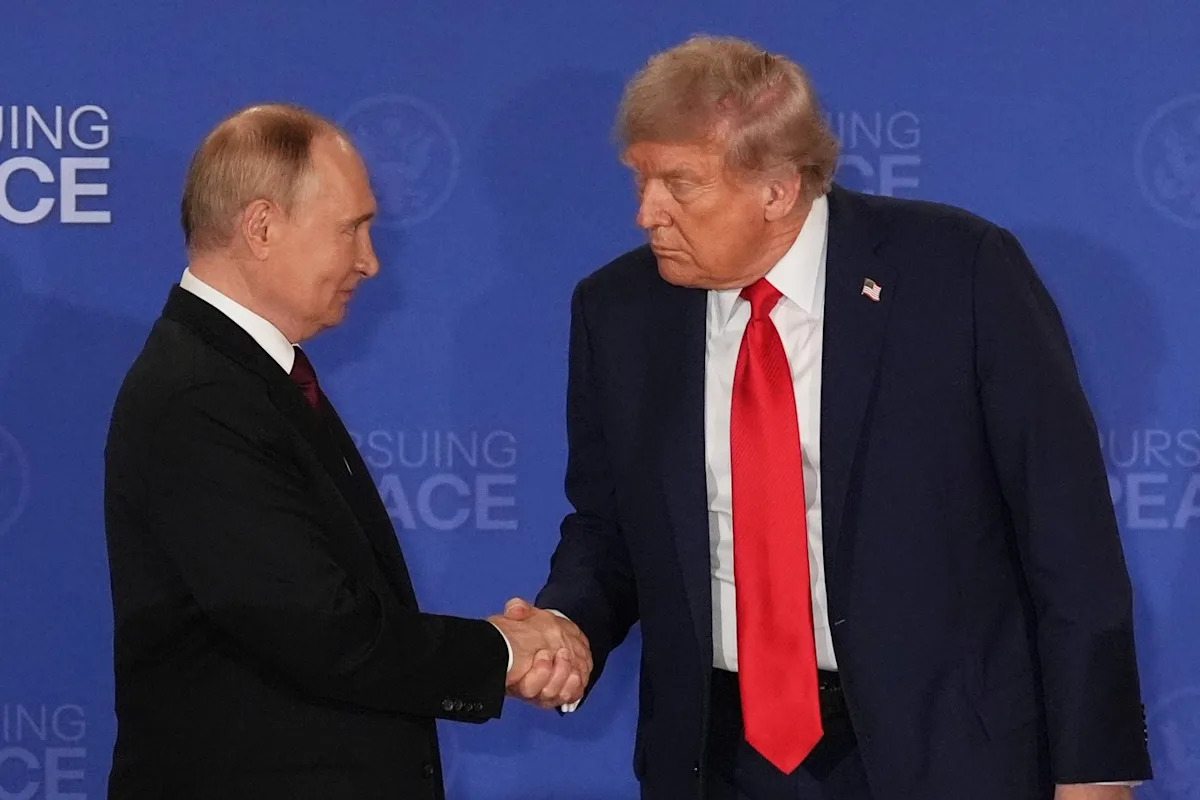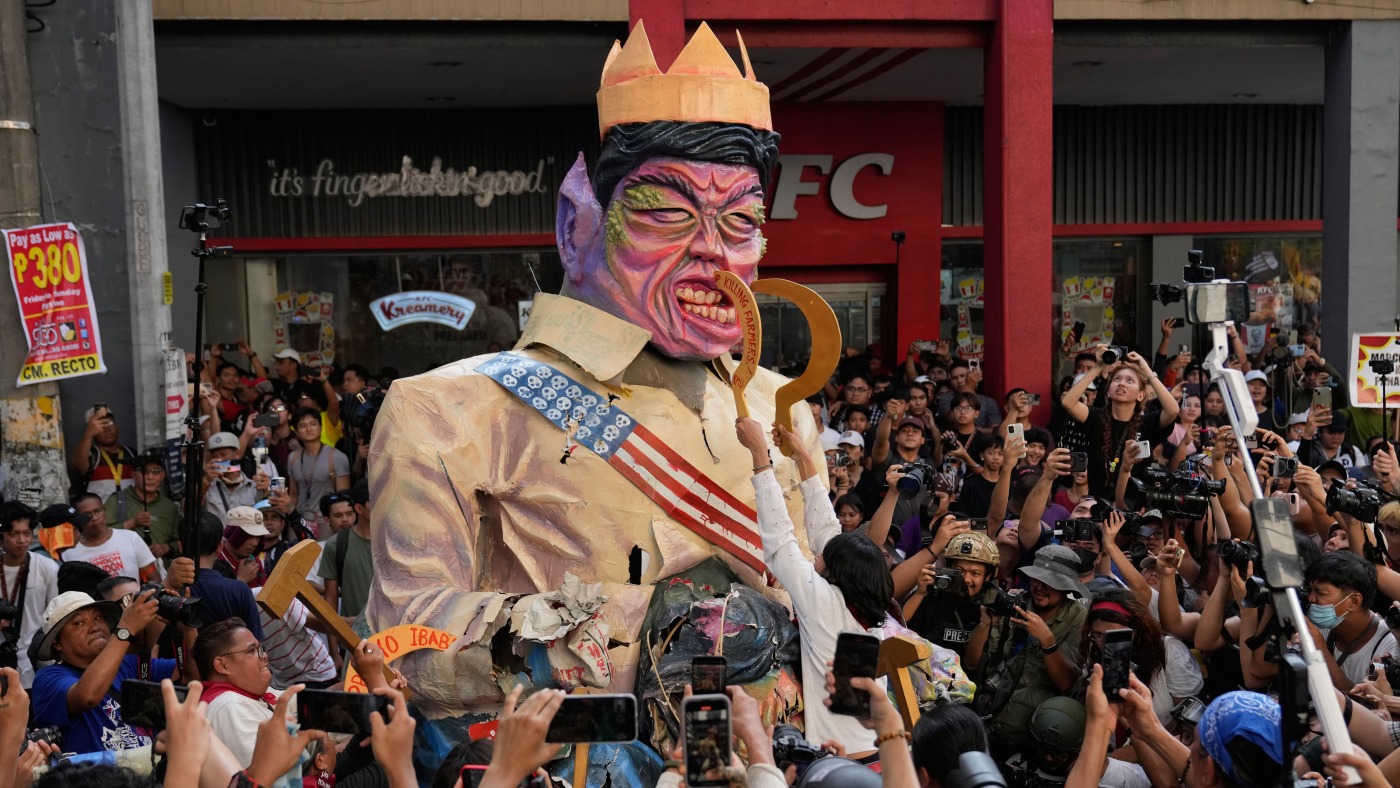WASHINGTON (AP) — President Donald Trump said on Thursday he would meet with Russia's Vladimir Putin in Hungary to try to resolve the war in Ukraine, but the date has not yet been set.
Trump spoke with Putin on Thursday as he considers Ukraine's pursuit of long-range missiles. The call came ahead of Trump's Friday meeting at the White House with the Ukrainian president. Vladimir Zelenskywho is pressuring Trump to sell Kyiv Tomahawk missiles that would allow Ukrainian forces to strike deeper into Russian territory. Zelensky argues that such strikes will help force Putin to take Trump's calls more seriously for direct talks between Russia and Ukraine to end the war.
Trump told reporters who traveled with him to Israel on Sunday that he planned to discuss Tomahawks with Putin as a way to force him to end Russia's war in Ukraine. “Do they want Tomahawks going in that direction? I don't think so,” Trump said Sunday. “I think I could talk to Russia about this.”
With fragile Ceasefire agreement between Israel and Hamas and hostages Trump said he is now turning his attention to ending the war in Ukraine and intends to weighing the provision of Kyiv with long-range weapons as he tries to push Moscow to the negotiating table.
Ending the wars in Ukraine and Gaza was a central plank of Trump's 2024 campaign, in which he has repeatedly criticized the president. Joe Biden for his conflict resolution. However, like his predecessor, Trump also found himself stymied by Putin as he unsuccessfully tried to get the Russian leader to negotiate directly with Zelensky put an end to the war, which has been going on for four years.
But fresh from the ceasefire in Gaza, Trump is showing new confidence that he can finally make progress in stopping the Russian invasion. He also makes it clear that he is ready to increase pressure on Putin if he does not come to the negotiating table soon.
“It's interesting that we made progress today because of what happened in the Middle East,” Trump said of the Russia-Ukraine war Wednesday night as he invited supporters of his White House ballroom project to a glitzy dinner.
Earlier this week in Jerusalem in a speech in the KnessetTrump predicted that the Gaza truce would lay the groundwork for U.S. assistance in normalizing relations between Israel and many of its Middle Eastern neighbors. But Trump has also made clear that his top foreign policy priority now is ending the biggest armed conflict in Europe since World War II.
“We have to do it with Russia first,” Trump said to his special envoy. Steve Witkoffwho was also his administration's chief interlocutor with Putin. “We have to do this. If you don't mind, Steve, let's focus on Russia first. Okay?”
Trump weighs Tomahawks for Ukraine
Trump is set to host Zelensky for talks on Friday, their fourth face-to-face meeting this year.
On the eve of the meeting, Trump said he was considering the possibility of selling Tomahawk long-range cruise missiles to Kyiv. Putin has made it clear that providing Tomahawks to Ukraine would cross a red line and further damage relations between Moscow and Washington.
But Trump was not bothered by this.
“He would like to have Tomahawks,” Trump said of Zelensky on Tuesday. “We have a lot of Tomahawks.”
Agreeing to sell Tomahawks to Ukraine would be a bold move, said Mark Montgomery, an analyst at the conservative Foundation for Defense of Democracies in Washington. But supplying and training Kyiv may take years. Tomahawk system.
Montgomery said Ukraine could benefit more in the near future from more extended-range attack munitions, or ERAMs, missiles and Army tactical missile system known as ATACMS.. The US already approved the sale of up to 3,350 ERAM to Kyiv earlier this year.
The Tomahawk, with a range of about 995 miles (1,600 kilometers), would allow Ukraine to strike much deeper into Russian territory than ERAM (about 285 miles or 460 kilometers) or ATACMS (about 186 miles or 300 kilometers).
“Providing Tomahawks is as much a political decision as it is a military decision,” Montgomery said. “ERAM has a shorter range, but it can help them put pressure on Russia operationally, on its logistics, command and control, and its force distribution within a few hundred kilometers of the front line. It can be very effective.”
Signs of White House interest in new sanctions against Russia
Zelensky is expected to repeat his call for Trump to hit Russia's economy with further sanctions, something the Republican appears reluctant to do to date.
Congress has weighed legislation that would tighten sanctions against Moscow, but Trump has largely focused on pressuring NATO members and other allies to stop buying Russian oil, the engine that fuels Moscow's war machine. To that end, Trump said on Wednesday that India, which became one of Russia's biggest oil buyers after the invasion of Ukraine, had agreed stop buying oil in Moscow.
Waiting for Trump's blessing is a bill in the Senate that would impose high tariffs on countries buying Russian oil, gas, uranium and other exports in an attempt to cripple Moscow's economy.
While the president has not officially endorsed it (and Republican leaders have no plans to move forward without his support), the White House has shown more interest in the bill behind the scenes in recent weeks.
Administration officials scrutinized the legislation, proposing amendments to its lines and demanding technical changes, according to two officials familiar with discussions between the White House and the Senate. On Capitol Hill, it was interpreted as a sign that Trump was becoming more serious about the legislation, sponsored by close ally Sen. Lindsey Graham, R-Conn., and Sen. Richard Blumenthal, D-Conn.
A White House spokesman said the administration is working with lawmakers to ensure that “the bills introduced advance the President's foreign policy objectives and authorities.” The official, who was granted anonymity to discuss private discussions, said any sanctions package must allow the president “full flexibility.”
Treasury Secretary Scott Bessent said Wednesday the administration expects more support from Europe, which he noted faces a greater threat from Russian aggression than the United States.
“So all I hear from Europeans is that Putin is coming to Warsaw,” Bessent said. “There are very few things in life that I am sure of. I am sure that he will not come to Boston. So we will respond … if our European partners join us.”
___
AP writers Fatima Hussain, Chris Megerian and Didi Tang contributed to this report.
Mid Kiim's main children, three, Thesociale Press








